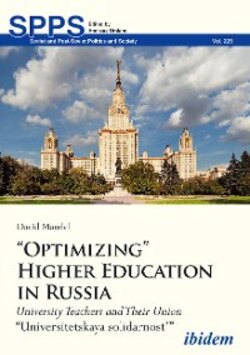Читать книгу “Optimizing” Higher Education in Russia - David Mandel - Страница 4
1. Introduction
ОглавлениеIn 2012, soon after his election to a third presidential term as president, following a four-year stint as prime minister (to avoid modifying the constitution), and in the wake of an unprecedented wave of popular protests, Vladimir Putin issued his “May Decrees.” Notable among them was the government’s commitment to increase the salaries of doctors, scientific researchers and university teachers to double the average in their respective regions by 2018.1 But then on December 30 of that year, the government issued a “road map” for education, revealing that the salary increases in higher education would be paid for, not by significant new government funding, but by “optimization,” which would eliminate 44% of the current teaching positions in higher education. This was justified in part by a forecasted drop in student enrolment.2
Thus opened a new, accelerated period of reform of higher education. This book examines the impact of these reforms on the condition of Russia’s university teachers and the collective efforts of some teachers, a small minority, to organize themselves in an independent trade union to defend their professional interests and their vision of higher education.
Apart from the subject’s intrinsic interest, an in-depth examination of this specific aspect of social policy provides valuable insight into the nature of the Russian state, as well as into the condition of “civil society,” in particular the popular classes, to which Russian university teachers belong according to their socio-economic situation, if not necessarily their self-image.
The policies promoted by the Russian government in higher education are not unique to that country. Over the past few decades, similar policies have been promoted, in various forms and degrees, in many countries. Many academics who read this book will recognize tendencies at work in their own countries and institutions. But rarely have these policies assumed so grotesque and destructive a form as in Russia.
It has been observed that neoliberalism, whatever its ideological justifications, is, in reality, the policy of the bourgeoisie when it does not encounter serious popular resistance.3 There is resistance in Russia, but for both historical and contemporary reasons it is very weak. The Russian case can, therefore, be read as a cautionary tale by anyone who holds a humanistic conception of higher education.
This research was conducted over several years. It included lengthy stays in Russia, during which I was conducted interviews and held informal discussions with university teachers and union activists. I also participated in union educational activities, meetings, conferences, and protests. The study also makes use of government and union documents, as well as published scholarly studies and articles from the press and the social media.
Since I do not believe that neutrality is possible in the study of study significant aspects of society, I will make clear my social and ideological commitments. I have long been active in my own university’s trade union, the first accredited professors’ union in Canada, and in its efforts to resist neo-liberal pressures. I have also long been involved in trade-union educational activities in Russia. Notwithstanding those commitments, I have tried my best to make honest use of all the materials that were available to me and did not select or distort facts in order to support a parti pris.
A note on terminology. The Russian term professor is not usually used generically to denote “university teacher”, as is often the case in North America for tenured or tenure-track teachers. In this text, the term professor will be reserved for holders of the Russian title (roughly equivalent to “full professor”). “University teacher” will be used as the generic term. Other titles for teaching positions in Russia and their rough North-American equivalents are: assistent (teaching assistant), prepodavatel’ (lecturer), starshii prepodavatel’ (senior lecturer), dotsent (associate professor)—the most numerous category.
1 http://www.rsr-online.ru/doc/2012_06_25/6.pdf (accessed May 30, 2018)
2 http://legalacts.ru/doc/rasporjazhenie-pravitelstva-rf-ot-30122012-n-2620-r/ (accessed May 30, 2018)
3 M. Dudcik and A. Reed Jr., “The Crisis of Labor and the Left in the U.S.,” in L. Panich and G. Albo, eds., The Socialist Register 2015, Merlin Press, London, U.K., 2015, p. 373, note 10.
